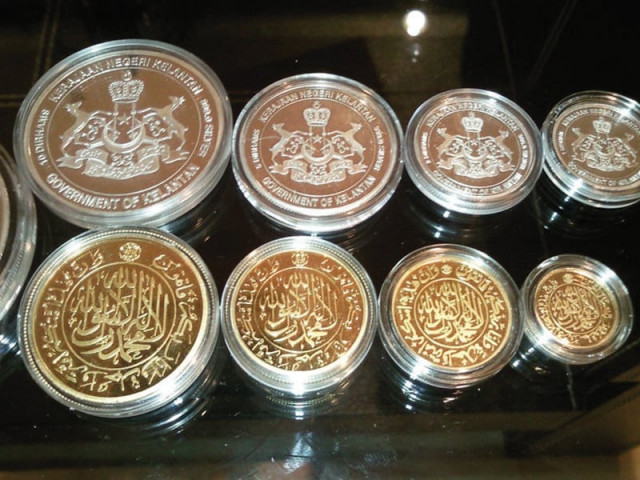Back to the gold standard: Some benefits of using gold as currency
In times of macroeconomic instability, the metal can become a useful store of value for investments.

The Malaysian state of Kelantan started issuing gold coins in 2006. Although the federal government of Malaysia does not recognise these coins as legal tender, the demand for these coins has been overwhelming. PHOTO: FILE
In an environment of high domestic inflation, deteriorating exchange rate of local currency against major foreign currencies and decreasing interest rates, preserving the value of savings and investment is certainly a challenging task. Most people, especially unsophisticated investors, tend to seek refuge in real estate in an attempt to preserve the value of investments. However, small savers and investors who prefer liquidity find it difficult to lock their savings in illiquid investments like property.
In the Indian sub-continent, there has been an historical obsession with gold as an enduring investment: women tend to try and convince their husbands to ‘invest’ in jewellery. All of us, however, know that gold jewellery has never been a good investment. The story is different when it comes to gold metal. Gold has always proven to be a safe haven for most investors, especially for the long run. In a country like Pakistan, which at present is facing all kinds of economic problems, it is becoming increasingly difficult for investors to preserve the real value of their investments. Meanwhile, local savers are also disheartened by the prospect of earning low, or in some cases negative, real return on their savings (and hence incurring a capital loss in real terms). This is also a deterrent for many foreign investors who may wish to invest in the country.

One viable option for many savers is to open up foreign currency accounts in local banks to hedge against exchange rate fluctuations and rising domestic prices. This remains a preferred option for many, especially those who receive foreign remittances on a regular basis. However, while most of the local and foreign banks operating in the country offer foreign currency (US dollar, British pound and euro) accounts, there are nearly zero gold-based savings and investment products.
Given the macroeconomic conditions, it is probably high time for the introduction of gold coins in Pakistan, as an attempt to introduce a stable currency for saving. The current share of Islamic banking in overall banking in Pakistan is about 8%, and we can expect that a very significant proportion of the banked individuals and households would be interested in saving in bullion. Islamic banks in the country can exploit this opportunity to win more business by introducing bullion accounts.
If the introduction of gold coins is successful, monetary authorities – ie, the State Bank of Pakistan – may consider using gold coins to bring about monetary reforms in the country. Indeed, advocates of monetary reform have for long advocated a return to the gold standard. Some prominent economists, like Nobel laureate Robert Mundell and James Robertson, have written a lot on the benefits of returning to the gold standard. In the context of Islamic banking and trade, the likes of the former prime minister of Malaysia, Dr Mahathir Mohamed, and activists like Tarek elDiwani have been influential figures advocating the introduction of gold dinars and replacing the fractional reserve based banking system.
In fact, the Malaysian state of Kelantan rather controversially started issuing gold coins in 2006. Although the federal government of Malaysia does not recognise these coins as legal tender, the demand for these coins has been overwhelming. Since then, some silver coins have also been sold to savers who would like to save them for the longer term.
While it may be a far-fetched idea to expect the State Bank of Pakistan to start issuing gold and silver coins, the increasing demand for Islamic banking in Pakistan offers Islamic banks a window of opportunity, to exploit which they can start offering bullion-based investments to those who consider gold coins to be more Shariah-compliant than conventional money, which is created through an interest-based credit system.
THE WRITER IS AN ECONOMIST AND A PHD FROM CAMBRIDGE UNIVERSITY
Published in The Express Tribune, January 28th, 2013.
Like Business on Facebook to stay informed and join in the conversation.



















COMMENTS
Comments are moderated and generally will be posted if they are on-topic and not abusive.
For more information, please see our Comments FAQ